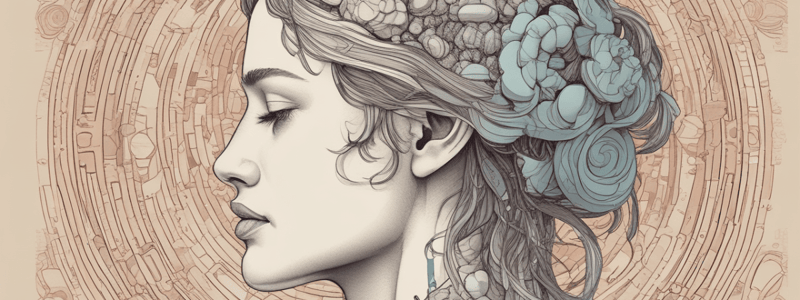Podcast
Questions and Answers
What is a characteristic symptom of cluster headaches?
What is a characteristic symptom of cluster headaches?
- Severe, recurrent headaches, often around the same time each day (correct)
- Sensitivity to light and sound
- Runny or stuffy nose
- Pain and pressure in the forehead, cheeks, and nose
What can trigger sinus headaches?
What can trigger sinus headaches?
- Hormonal fluctuations
- Recurring, severe headaches
- Overuse of pain relievers
- Inflammation and congestion of the sinuses (correct)
What is the typical cause of rebound headaches?
What is the typical cause of rebound headaches?
- Overuse of pain relievers (correct)
- Inflammation of the sinuses
- Hormonal fluctuations
- Severe, recurrent headaches
Who are hormone headaches typically associated with?
Who are hormone headaches typically associated with?
What is the primary step in treating rebound headaches?
What is the primary step in treating rebound headaches?
What is the primary way to diagnose exertional headaches?
What is the primary way to diagnose exertional headaches?
What is the main cause of thunderclap headaches?
What is the main cause of thunderclap headaches?
What is the primary treatment for thunderclap headaches?
What is the primary treatment for thunderclap headaches?
What is the typical duration of ice cream headaches?
What is the typical duration of ice cream headaches?
What can birth control methods help regulate in women?
What can birth control methods help regulate in women?
What is the primary cause of tension headaches?
What is the primary cause of tension headaches?
What is the typical duration of cluster headaches?
What is the typical duration of cluster headaches?
What is the primary method of diagnosing migraines?
What is the primary method of diagnosing migraines?
What is the primary treatment for migraines?
What is the primary treatment for migraines?
What is the characteristic pain of tension headaches?
What is the characteristic pain of tension headaches?
Flashcards are hidden until you start studying
Study Notes
Types of Headaches
- Tension Headaches:
- Most common type of headache
- Cause steady, dull pain on both sides of the head
- Often described as a band-like pressure or tightness around the head
- Triggers: Stress, muscle tension, poor posture, and anxiety
- Diagnosis: Based on medical history and symptoms
- Treatment: Over-the-counter pain relievers, relaxation techniques, stress management, and physical therapy
Migraines
- Intense, throbbing headaches that can last for hours or days
- Accompanied by nausea, vomiting, and sensitivity to light and sound
- Causes: Related to changes in blood flow, brain chemistry, and genetics
- Diagnosis: Based on detailed medical history, symptoms, and ruling out other possible causes
- Treatment: Migraine-specific medications, lifestyle modifications, and identifying and avoiding triggers
Cluster Headaches
- Extremely painful headaches that occur in clusters
- Typically last between 15 minutes to 3 hours
- Localized around one eye or temple
- Causes: May be related to abnormalities in the hypothalamus
- Diagnosis: Based on the distinctive pattern of severe, recurrent headaches
- Treatment: High-flow oxygen therapy, triptans, and preventive medications
Sinus Headaches
- Pain and pressure in the forehead, cheeks, and nose
- Accompanied by symptoms like a runny or stuffy nose
- Causes: Inflammation and congestion of the sinuses due to allergies, infections, or other underlying sinus conditions
- Diagnosis: Based on the presence of symptoms and sometimes confirmed with imaging tests or sinus examinations
- Treatment: Addressing the underlying sinus condition, which may include antibiotics, decongestants, and pain relievers
Rebound Headaches
- Occur when a person overuses pain relievers or migraine medications
- Worsen as the medication wears off
- Causes: Overuse of medications like acetaminophen, ibuprofen, or triptans
- Diagnosis: Based on a pattern of frequent headache occurrence linked to overuse of pain medications
- Treatment: Discontinuing the use of the medications causing the rebound headaches, and alternative treatments
Hormone Headaches
- Associated with hormonal fluctuations, often occurring in women
- Triggers: Changes in estrogen levels, such as during menstruation, pregnancy, or menopause
- Causes: Hormone fluctuations affect blood vessels and neurotransmitters in the brain
- Diagnosis: Involves tracking headache patterns in relation to hormonal fluctuations
- Treatment: Hormone therapy, lifestyle modifications, and preventive medications in some cases
Exertional Headaches
- Occur during or after physical activity, particularly strenuous exercise
- Described as pulsating and can last from a few minutes to several hours
- Causes: May be related to increased blood flow and pressure changes in the head during exercise
- Diagnosis: Based on the patient's history of headaches associated with physical activity
- Treatment: Managing exercise intensity and hydration, and preventive medications in some cases
Thunderclap Headaches
- Sudden, severe headaches that reach their peak intensity within seconds
- Can be a sign of a serious underlying condition, such as a ruptured blood vessel or infection
- Diagnosis: Involves imaging tests like CT scans or MRIs to rule out life-threatening causes
- Treatment: Immediate medical attention to address the underlying cause
Ice Cream Headaches (Cold-Stimulus Headaches)
- Brief, sharp headaches that occur when consuming something cold, such as ice cream or frozen drinks
- Pain typically lasts for a few seconds to a minute
- Causes: Related to rapid temperature changes in the mouth and throat
- Diagnosis: Based on a patient's report of headaches triggered by consuming cold items
Studying That Suits You
Use AI to generate personalized quizzes and flashcards to suit your learning preferences.




